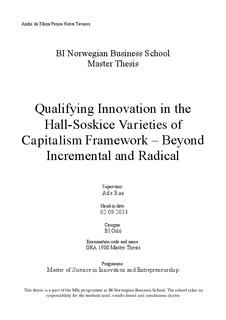| dc.contributor.author | Tavares, André de Meira Penna Neiva | |
| dc.date.accessioned | 2014-02-19T14:41:32Z | |
| dc.date.available | 2014-02-19T14:41:32Z | |
| dc.date.issued | 2014-02-19 | |
| dc.identifier.uri | http://hdl.handle.net/11250/94919 | |
| dc.description | Masteroppgave (MSc) in Master of Science in Innovation and Entrepreneurship, Handelshøyskolen BI, 2014 | |
| dc.description.abstract | Innovation research, interested in understanding the mechanisms behind the discovery and survival of new products and services, is a young science still feeling its way in the vast academic world. It has frequently fascinated researchers of other fields who have tried to integrate its ideas and concepts into their own studies. The institutional framework called Varieties of Capitalism (VoC) is no different and its analysis of the differences among developed economies led to the hypothesis that Coordinated Market Economies (CMEs) adopt incremental innovation patters while Liberal Market Economies (LMEs) prefer radical innovation patterns. Yet, this dichotomy has not been without severe criticism, leaving a void as to how to better qualify innovation practices among modern capitalist economies.
This paper attempts to go beyond these limitations. It uses recent innovation indicators pertinent to the VoC framework to establish what type of innovation practice is preferred by a particular type of capitalist organizational model. It will focus on the clean technology sector in order to better understand the differences between the different types of economies. It will be shown that CMEs opt for strategies that focus on applied research and strong technical/vocational education that allows technological breakthroughs to seep into the economy through existing business structures and/or by way of strong government regulation. LMEs, on the other hand, manage to structure their institutional landscape towards strengthening the main drivers of technological discovery and diffusion, thanks notably to efficient government support measures. The playing field these measures create allow for fluid business structures where entrepreneurial start-ups can thrive and disseminate technological breakthroughs throughout the economy. | no_NO |
| dc.language.iso | eng | no_NO |
| dc.subject | innovasjon | no_NO |
| dc.subject | entreprenørskap | no_NO |
| dc.subject | innovation | no_NO |
| dc.subject | entreprenørskap | no_NO |
| dc.title | Qualifying innovation in the Hall-Soskice "Varieties of capitalism" framework : beyond incremental and radical | no_NO |
| dc.type | Master thesis | no_NO |
